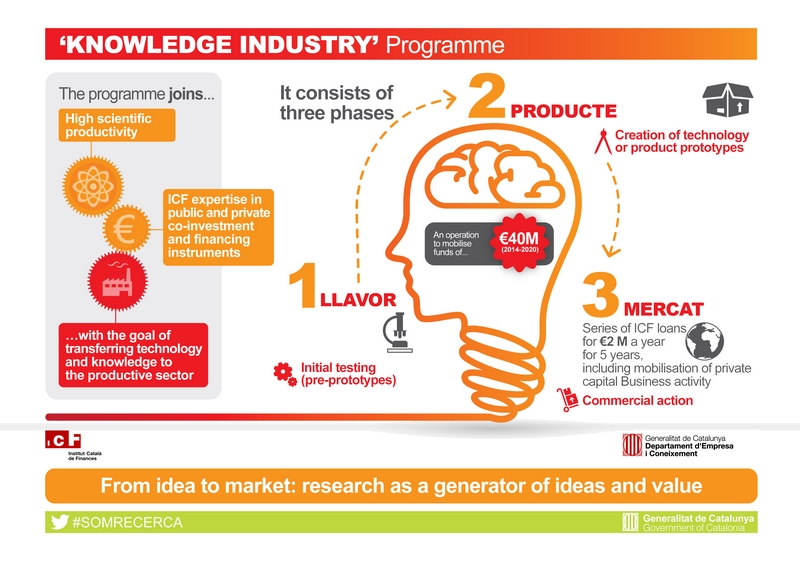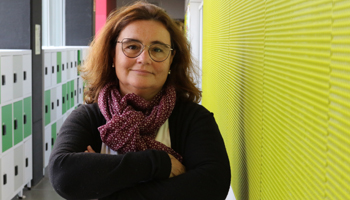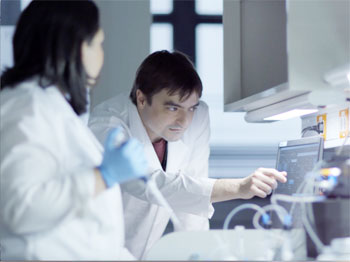 From idea to the market. The aim of the Knowledge Industry Programme is to foster the development of new science-based spin-off companies, derived from the research carried out at universities and research centres, as part of the strategy to transfer the technology and knowledge generated in the academic and scientific sphere to the business sector.
From idea to the market. The aim of the Knowledge Industry Programme is to foster the development of new science-based spin-off companies, derived from the research carried out at universities and research centres, as part of the strategy to transfer the technology and knowledge generated in the academic and scientific sphere to the business sector.
In this context, two projects led by IBEC researchers have been granted by Knowledge Industry Programme 201 of AGAUR, the Agency for Management of University and Research Grants.
DERMOGLASS: Fabrication and testing of a dressing prototype for wound healing
Chronic wounds represent a silent epidemic that affects a large fraction of world population (1-2% in developed countries) and is expected to grow with increasing ageing population. DERMOGLASS is a novel and patented technology developed by the “Biomaterials and Regenerative Therapies” in IBEC led by Professor Elisabeth Engel. This technology is based on advanced biodegradable nanoma terials that increase fibroblast activity and trigger wound re-vascularization through the management of ionic wound microenvironment, that ultimately will promote wound repair. Thus, DERMOGLASS acts as a bioactive treatment, but without using drugs, proteins or cells. The present project has been granted under the “Product” modality of the call, and co-funded by AGAUR and FEDER funds, aims at the completion of the proof-of-concept, the scale-up and licensing of the technology.
terials that increase fibroblast activity and trigger wound re-vascularization through the management of ionic wound microenvironment, that ultimately will promote wound repair. Thus, DERMOGLASS acts as a bioactive treatment, but without using drugs, proteins or cells. The present project has been granted under the “Product” modality of the call, and co-funded by AGAUR and FEDER funds, aims at the completion of the proof-of-concept, the scale-up and licensing of the technology.
BLAD: BioLiver Assist Device
The liver is the only visceral organ with capacity of regenerates and repair itself and its starts soon after chemical and physical injury of the liver. Nevertheless, when this capacity is completely exhausted, chronic liver disease such as Non-alcoholic fatty liver disease (NAFLD) can occur. The Group of ICREA Research Professor Javier Ramón at IBEC, wants to contribute to solutions to this problem. The present project has been granted under the “seed” modality of the call.
With the project BLAD, the overall objective is to complete the in vitro validation of the artificial liver. The “Symbiotic” artificial liver represents a new innovative approach to lighten the pressure on the liver coming from the gut and allow its self-regeneration. This artificial  liver is constituted by microencapsulation of 3D bioprinted immortalized hepatocytes (embedded in a collagen matrix to recreate the native 3D architecture. The bioprinted liver tissue will be macroencapsulated to further protect and stabilize the cells. Similar to a dialysis machine when the device is connected to portal vein, blood is filtered, remixed and returned “clean” to the liver. The device will be employed to protect other vital organs in patients during liver failure and gain sufficient time for a patient’s liver to recover from the effects of the disease. In this phase of the project, positive outcome will be the identification of the optimal working conditions, size and geometry of the artificial liver.
liver is constituted by microencapsulation of 3D bioprinted immortalized hepatocytes (embedded in a collagen matrix to recreate the native 3D architecture. The bioprinted liver tissue will be macroencapsulated to further protect and stabilize the cells. Similar to a dialysis machine when the device is connected to portal vein, blood is filtered, remixed and returned “clean” to the liver. The device will be employed to protect other vital organs in patients during liver failure and gain sufficient time for a patient’s liver to recover from the effects of the disease. In this phase of the project, positive outcome will be the identification of the optimal working conditions, size and geometry of the artificial liver.
These projects have been co-funded by the European Union through the “Fons Europeu de Desenvolupament Regional” (FEDER) with the support of the Secretary of Universities and Research of the Department of Business and Knowledge of the Generalitat de Catalunya, the Catalan Government.







